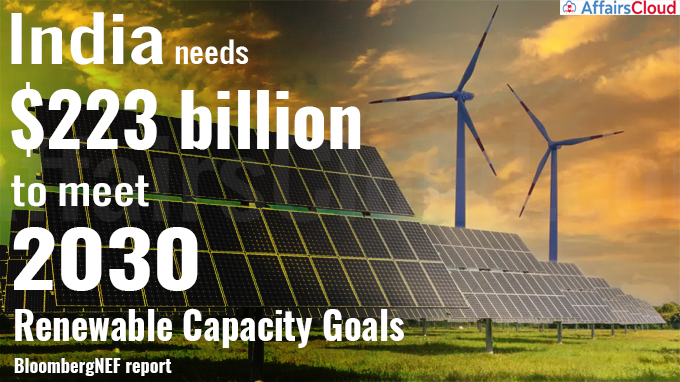
According to the BloombergNEF (BNEF)’s report titled “Financing India’s 2030 Renewables Ambition”, published in association with the Power Foundation of India, states that India will need USD 223 billion investment to achieve the goals of the government of India to increase the non-fossil power, wind and solar, capacity to 500 gigawatts (GW) by 2030.
- By 2030, India aims to provide around 50% of its electricity demand from renewable energy. In order to achieve this target, India needs to scale up funding for renewables.
- The report estimates a requirement of USD 223 billion over the next 8 years to meet the solar and wind capacity targets.
- The report also explores various methods to mobilise this funding.
Note: Shantanu Jaiswal, Head of India research at BNEF, was the lead author of the report.
India’s Target:
i.At the 26th United Nations Climate Change Conference(2021) in Glasgow (COP26), Prime Minister (PM) Narendra Modi announced that India has planned to reduce the emission intensity by over 45% by 2030 to below 2005 levels. He also announced India’s target to achieve net-zero by 2070.
ii.By 2021, around 165GW of zero-carbon generation had already been installed in India.
Gist of the Report:
i.The report has noted that corporate commitments from Indian companies could help India achieve 86% of its 2030 goals of building 500GW of cumulative non-fossil power generation capacity.
ii.The Central Electricity Authority of India estimates that India’s reliance on coal will reduce by 53% of installed capacity in 2021 to 33% in 2030 and the solar and wind (combined) will make up to 51% by 2030, up from 23% in 2021.
Key Points:
i.Rising interest rates, a depreciating rupee and high inflation create challenges for the financing of renewables.
ii.Independent Power Producers are required to tap into new or underutilised sources of capital. This could be revolving construction debt, investment infrastructure trusts and funding from retail investors, insurance companies and pension funds.
iii.The higher funding requirements also need measures that can increase the availability of financing, such as de-risking renewable projects to offering contractual terms that provide greater comfort to investors.
Additional info:
i.India was ranked among the leading emerging markets covered by Climatescope, the flagship report of BNEF, analysing market attractiveness for energy transition investment.
ii.In 2021, India topped the ranking in the power category among 107 emerging markets.
Rapid transition to clean energy could create 1.5 crore new jobs in India by 2025: New Report
Ahead of the Group of Seven (G7) leader’s summit, We Mean Business Coalition and Cambridge Econometrics published a new report titled “Creating Jobs and Cutting Bills: the economic opportunities of a clean energy transition”. The report states that rapidly implementing policies to end dependency on fossil fuels and switching to clean energy could lead to the creation of 1.5 crore new jobs in India by 2025 and increase savings on electricity bills.
- The report also states that India could witness an 8 USD or 10% reduction in per capita energy expenditure by 2025 compared with the business as usual scenario.
- The reduction in per capita energy expenditure in India is estimated to be 34 USD or 31% by 2030 and 74 USD or 52% by 2035 from the business as usual scenario.
Key Points:
i.The report also finds that the rapid implementation of policies to end fossil fuels dependency will save families across G7 countries USD 480 per capita on their total annual energy bills, which includes electricity, natural gas and petrol, by 2030.
ii.This also suggests that the governments set out national action plans in 2022 to eliminate all fossil fuel subsidies by 2025 and repurpose the monies towards energy efficiency, renewable energy, and other measures that support people-centred and equitable clean energy transition.
iii.It also asked the G7 nations to phase out domestic coal-fired power generation by 2030 and scale up renewable energy deployment to achieve 70% of power generation by 2030.
iv.The report also asks the G7 nations to commit to 100% sales of zero emissions by 2035 for new light-duty vehicles and increase public spending for energy efficiency.